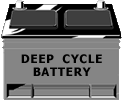Results are based on a standard terminal voltage of 12.5V (remember 13.8V is the charge voltage) and the maximum that each of the three types of batteries can be safely discharged to before losing the ability the recharge to 100% of their original capacity. Generally speaking, True "Deep Cycle" batteries can be discharged to 20% of their capacity (They have 80% usable charge) and Marine Batteries to 50% of their capacity (they have 50% usable charge). Normally Automotive batteries can be discharged to only 80% of their capacity. (They have 20% usable charge and should NOT be used to run 12V equipment for any length of time)
Whilst your battery will continue to function well below these figures you will siginificantly shorten its charge and recharge life cycle - ie each time it is discharged below its usable charge % it will lose some of its original capacity no matter how long you recharge it for.
Calculations are performed assuming a battery in perfect condition and show maximum expected running times based on the above safe discharge percentages.
All Calculated Values are Expressed in HOURS and are Representative of Usage To Minimum Safe Discharge Threshold

